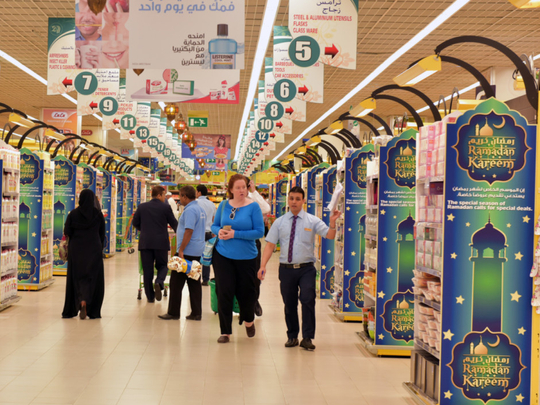
Dubai: Despite assurances that retailers will slash the prices for basic essentials during Ramadan, the majority of residents in the UAE are still anticipating an increase in household spending throughout the fasting period, a new survey suggests.
According to the findings released by market research firm YouGov on Tuesday, nearly six in ten (57 per cent) of consumers in the UAE and Saudi Arabia expect the prices for goods and services to rise over the month.
The Ministry of Economy had earlier said that the price for basic food items sold at groceries or supermarkets will drop by up to 50 per cent during Ramadan. The Ramadan campaign, however, covers only the basic items that people consume during the fasting period.
“It is always interesting to see how research reveals consumers’ perceptions and how they often drive their behaviour and opinion. In this instance, we can deduce that consumers still perceive and expect that prices of goods and services will go up during the Holy month of Ramadan, despite being told otherwise,” Nehal Jibouri, head of consumer, media and technology research at YouGov Mena, told Gulf News in an email.
“Consumers also have perceptions of continued inflation over time, coupled with their own increased spending habits during the Holy month, which may have also contributed to these perceptions of higher prices.”
Jibouri, however, clarified that their findings are inclusive of both UAE and Saudi Arabia consumers, so the drop in prices stated by the UAE government would be relevant to residents across the emirates only.
The survey results seem to coincide with the trend that people tend to shop more for food and non-food items during Ramadan. An analyst had said that, as millions of consumers hit the grocery aisles and shops during the season, overall consumer spending will increase by 15 per cent to 30 per cent.
The ninth month of the Islamic calendar started on Saturday and Muslims around the world are expected to avoid eating or drinking during daylight hours. Instead of holding on to their purses, however, consumers end up spending more.
According to James George, analyst at Euromonitor International, overall consumer spending on food and non-food items increase by 15 per cent, while e-commerce sites see a 30 per cent rise in sales during the season.
“Ramadan is clearly a month of high consumer spend especially on food items. Iftars tend to be elaborate with the invitation of friends and family over, also in addition to gifts that are bought during this season,” George told Gulf News.
The YouGov survey also found that accommodation rents remain the biggest contributor to household spending.
About 21 per cent of the respondents in the UAE said that larger household expenses over the past year went to housing rent, while transportation costs, including car purchase, service fees and insurance, are the second biggest category that consumers are spending on, followed by household appliances.
When it comes to freebies, consumers said the three most appealing for them are those that offer free additional units, such as buy 1 get 1 free campaigns (49 per cent), price discounts (49 per cent) and cash back vouchers (36 per cent).












